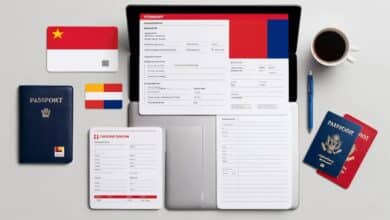Discover Visa Sponsorship Opportunities in Milan, Italy: Advantages and Application Path
Milan stands as a top destination for global professionals aiming to advance their careers in Europe.
Known for its vibrant economy and cultural richness, the city offers diverse pathways for skilled workers to secure employment authorization. This guide explores practical strategies for navigating Italy’s immigration framework while highlighting Milan’s unique advantages.
The city’s thriving business environment attracts multinational companies and innovative startups alike. Industries ranging from finance to technology actively seek international talent, creating opportunities for professionals with specialized skills. Legal pathways often begin with employer-supported applications, but alternative options exist for entrepreneurs and service workers.
Understanding local requirements is crucial for a successful transition. Many applicants underestimate the importance of aligning their qualifications with regional demands. Proper preparation helps avoid common pitfalls and streamlines the approval process.
Milan’s position within the EU provides additional benefits for approved candidates. Access to neighboring markets enhances career growth potential, while the city’s cosmopolitan atmosphere eases cultural adaptation. Emerging sectors like healthcare and hospitality now offer competitive packages to attract global talent.
This resource clarifies misconceptions about Italy’s immigration policies and outlines actionable steps for long-term residency. Whether pursuing traditional employment or niche roles, readers gain insights to make informed decisions about their European career journey.
Introduction to Visa Opportunities in Milan
Navigating Italy’s immigration policies starts with understanding Milan’s dual visa categories. The Flow Decree system shapes how professionals access work permits, dividing options into quota-limited and quota-free pathways. Annual government allocations create time-sensitive windows for certain applications, making early preparation critical.
Understanding the Current Immigration Landscape
Italy’s “in quota” system applies to roles with annual limits, often filling quickly during peak hiring seasons. For example, 2023 saw 82,000 permits allocated across sectors like hospitality and engineering. Conversely, “extra quota” pathways prioritize candidates meeting specific skill or investment criteria without numerical caps.
Milan’s business networks streamline sponsorship processes better than other regions. Over 60% of multinational firms here have dedicated teams for employment authorization.
“The city’s economic diversity reduces competition for quota slots compared to national averages,”
notes a regional labor report.
Setting Your Immigration Goals
Five-year residency plans require aligning career moves with Italy’s priority industries. Technical experts and service workers find faster approvals due to northern Italy’s industrial demands. Entrepreneurs benefit from relaxed quotas if investing €500,000+ in local ventures.
Permanent residency becomes attainable after legally residing for five consecutive years. Applicants should track regional job trends and language requirements to strengthen long-term prospects. Proactive documentation reduces delays during quota application periods.
Overview of Italian Visa Options
The Italian government structures work permits through two primary mechanisms. Annual quotas determine availability for certain categories, while others remain accessible year-round. Timing and eligibility requirements vary significantly between these pathways.
In Quota vs Extra Quota Visas
Quota-regulated permits face strict annual limits set by the Flow Decree. For example, only 7,000 seasonal worker slots were available nationwide in 2023. Applications often close within weeks during specific enrollment periods. Non-quota options apply to specialized professionals, investors, or family reunification cases without numerical restrictions.
“Meeting basic requirements guarantees approval for extra quota applicants, provided documentation meets legal standards,”
Long-Term and Short-Term Visas Explained
Type D permits allow stays exceeding 90 days and convert into renewable residence documents. These typically align with employment contracts lasting up to 24 months. Short-term Schengen visas (Type C) prohibit work activities and cannot be extended beyond three months.
All non-EU nationals must obtain residence permits within eight days of arrival for long-term stays. Exceptions exist only for specific bilateral agreements. Strategic planning helps applicants match their career objectives with suitable authorization types.
Visa Sponsorship in Milan: Navigating the Application Process
Securing authorization to work in Italy’s business hub involves three critical stages. Each phase demands precise documentation and strict adherence to timelines. Employers and applicants must collaborate closely to avoid delays.
Step-by-Step Application Path
The journey begins with the employer submitting a Nulla Osta request. This certificate confirms no local candidates fill the role. Approval typically takes 30-60 days, depending on regional workload.
Successful applicants then visit an Italian consulate. They submit biometric data and original documents like employment contracts. Type D visas require in-person interviews in most countries.
Upon arrival, workers have eight days to request residence permits. Post offices distribute “yellow kits” containing application forms. Fingerprinting appointments follow within 30 days at police stations.
Managing Quota Limitations and Deadlines
Quota-bound categories require strategic timing. The government announces annual allocations through the Flow Decree, usually in Q1. Popular sectors like IT often exhaust slots within weeks.
Companies monitor decree publications to file immediately. Legal experts recommend preparing dossiers in advance. Electronic submissions now accelerate processing for time-sensitive cases.
Delays commonly occur during peak seasons. Maintaining open communication with immigration desks helps resolve issues faster. Many firms use tracking systems to update applicants throughout stages.
Eligibility and Documentation Requirements
Meeting Italy’s criteria for legal entry demands careful attention to qualifications and paperwork. Different pathways have distinct thresholds, from academic credentials to financial proof. Preparation starts by matching personal circumstances with the right category.
Educational and Professional Experience Criteria
Academic requirements vary across authorization types. Employment-based routes often need verified degrees or trade certifications. For example, engineering roles typically require accredited bachelor’s degrees. Some sectors accept professional experience instead. Hospitality workers might qualify with five years of documented work history.
Investment pathways prioritize financial capacity over formal education. Startups demand €50,000 minimum investments, while established companies require €250,000.
“Proof of fund origins is as critical as meeting monetary thresholds,”
states an Italian Interior Ministry advisory. Self-employment applicants must show business plans approved by local chambers of commerce.
Essential Supporting Documents
Standard paperwork includes authenticated birth certificates and police clearance reports. Employment contracts must detail salary, role duration, and employer registration details. Medical certificates from approved clinics remain valid for six months.
Family reunification cases need marriage or birth certificates translated by sworn linguists. Long-term residency seekers provide five years of tax filings and A2 language certificates. All documents require apostille stamps or consular legalization for international validity.
Advantages and Benefits of Working in Milan
Professionals choosing Milan discover a balanced blend of career growth and cultural enrichment. The city’s economic ecosystem supports diverse industries while maintaining a high quality of life for international workers.
Financial and Lifestyle Perks
Competitive salaries in sectors like tech and design often exceed EU averages. Many companies offer relocation packages covering temporary accommodation or language courses. Affordable public transport and shorter work hours compared to other European hubs enhance daily living.
Local services simplify settling in, from housing assistance to family support programs. Schools and healthcare facilities cater to multilingual communities, easing transitions for new residents. Cultural festivals and historic landmarks provide year-round recreational options.
Pathways to Permanent Residency
Legal employment for five consecutive years opens routes to long-term residency. Applicants must demonstrate stable income and integration efforts, such as basic Italian proficiency. Family members can join through streamlined processes after initial approval.
Specialized roles in high-demand fields accelerate eligibility timelines. Professionals contributing to innovation or regional development often receive priority consideration. Legal advisors help navigate documentation requirements for seamless status upgrades.
For more information, explore the official visa website mentioned in this article:
You will be redirected to another website
FAQ
What are the differences between in quota and extra quota visas?
In quota visas fall under Italy’s annual immigration quotas set by the government, while extra quota visas apply to roles exempt from these limits, such as highly skilled workers or those in high-demand sectors like tech or healthcare.
How long does the application process take for employment in Milan?
Processing times vary but typically take 2–6 months. Delays may occur due to quota availability, document verification, or employer preparation of the employment contract and residency paperwork.
What professional experience is required for eligibility?
Employers often seek candidates with 3–5 years of relevant experience, specialized skills, or advanced degrees. Fields like engineering, IT, and healthcare prioritize certifications or licenses recognized in Italy.
Do companies provide relocation support for foreign workers?
Many employers assist with housing searches, language courses, and residency permit applications. Benefits like tax breaks or health insurance may also be included in the employment contract.
Can family members join visa holders in Milan?
Yes. Long-term visa holders can apply for family reunification, allowing spouses and children to reside in Italy. Proof of stable income and adequate accommodation is typically required.
What financial benefits come with working in Milan?
Employees often receive competitive salaries, annual bonuses, and tax incentives under Italy’s “impatriate regime,” which reduces taxable income by 70% for up to 5 years for eligible workers.
How does one transition to permanent residency?
After legally residing in Italy for 5 years, individuals can apply for permanent residency. Requirements include a clean criminal record, proof of income, and passing a basic Italian language test.
Are short-term visas convertible to long-term options?
Some temporary permits, like the 1-year elective residency visa, may be extended or converted if the individual secures a qualifying job offer or meets specific investment criteria.
Published on: 18 de July de 2025







